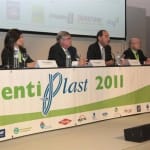 Organized by PlasticsEurope and the International plastics value chain, Identiplast 2011 was held at the Royal Tapestry Factory in Madrid.
Organized by PlasticsEurope and the International plastics value chain, Identiplast 2011 was held at the Royal Tapestry Factory in Madrid. The event welcomed prestigious decision makers and representatives of the value chain around the topic of plastics waste management, and demonstrated a common willingness to achieve a zero landfill society.
This ninth edition of the international congress was inaugurated by Mr. Alejo Vidal-Quadras, Vice President of the European Parliament, while Mr. Jesús Guinea, Managing Director of the Chemicals Division at Repsol, also gave an opening speech.
Mr. Alejo Vidal-Quadras said that "at this stage of technological development it is not a fantasy to think of a near future in which all waste is recycled or recovered", before adding that he was "delighted to see that the whole plastics industry is making great efforts to achieve a total sustainability". The Vice-President of the European Parliament also highlighted the valuable contribution of plastics in reducing emissions and improving people’s quality of life.
These statements were welcomed by Mr. Jesus Guinea: "I am convinced that together we can play an increasingly significant role. To achieve this we need the support of the government. We have to raise public awareness on the benefits of plastics and share experiences to promote better waste management and energy recovery", he said.

The programme also welcomed presentations from other leading European figures such as Mr. Helmut Maurer of DG Environment and Ms. Teresa Barres of the Spanish Ministry of Environmental, Rural and Marine Affairs. Speakers concentrated their presentations on best waste management practices and the need to prevent plastics from ending up in landfills and to recover its embedded value. IdentiPlast was also a good opportunity to raise awareness and tackle the existing issues faced by Spain, ain particular the overuse of landfill.
Overall, Identiplast 2011 demonstrated that our society can make the most of plastics in a sustainable manner. However, this needs proper instrumentation, a strong political willingness to develop initiatives, a clear commitment to innovation and, last but not least, a transfer of knowledge, technologies and best practices in the management of plastics waste.
The Plastic Industry also reiterated his commitment to share experiences and know-how in order to optimize the value of plastics products at end of life stage. This avoiding plastics ending up in landfills, promoting the quality of recyclates and encouraging energy recovery for those used plastics whose recycling present no real environmental benefits.
The event ended with a remarkable success of participation, with more than 180 delegates from over 15 countries around the world attending. Participants expressed their satisfaction regarding the excellent organization and content of the programme.




